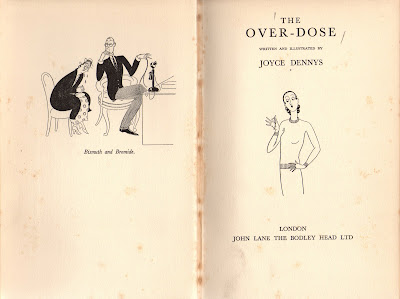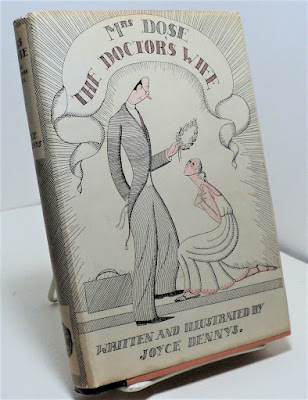Gerard said: "I shall never be able to hold up my head in Baronbury again."
Julia went on turning her patience cards over in neat groups of three. But she cheated just enough to bring the king where she wanted it, and slapped it complacently on top of the queen. "Then go and hold it up somewhere else," she said.
Gerard Munro is, first and foremost, a gentleman, and (at least at the opening of Reluctant Adonis) a rather stuffy one at that. He's not having nearly as much fun as his friend Julia Taunton, taking the high road by spending the night in a hotel room so his philandering wife Daphne will be able to divorce him without getting her well-manicured fingers dirty. Julia sees it all as a lark—"I came here to break the seventh commandment as a purely friendly gesture, I admit, but I wish you could see your way to being a little less disheartening about my company"—but Gerard is comically upset and offended by it all.
Think Katherine Hepburn or Irene Dunne as the wry, cheerfully maneuvering Julia, and surely Cary Grant was made for the role of the easily flustered, stuffy-but-with-potential-to-loosen-up Gerard. It might not have been quite on a par with masterpieces like Bringing Up Baby or The Awful Truth, but surely Reluctant Adonis the film would have been a couple of hours enjoyably spent—as indeed was the novel. Perhaps Ann Stafford and Jane Oliver were even hoping to make their fortunes in Hollywood, as they are certainly rather in screwball comedy vein here, if perhaps not quite so irresistibly as in Business as Usual and its sequel Cook Wanted, which I discussed here.
One of my happiest achievements while reading Reluctant Adonis was to finally actually look up and come to to understand (I think) just what the heck a "decree nisi" actually was. After Gerard and Julia spend their awkward and (on Gerard's part) grumpy night together, we skip ahead to Daphne getting hers, but then there are all sorts of complications and potential complications. I think I'd always assumed that a decree nisi was basically the finalization of a divorce, but no! I was underestimating the extent to which silly bureaucracy has seen fit to attempt to regulate the emotions. In fact, a decree nisi merely defines a period of time (often six months) after which, if no offensive behavior has occurred, a divorce will become final. Ironically (and idiotically), this means even offensive behavior on Daphne's part, though she was (officially) the unoffending party. Fortunately, I've never needed personal knowledge of such things (though Andy might wryly note that there's still time).

The logistics of a 1930s divorce might be unbelievable to today's readers, but it's nothing compared to the implausibility of Gerard receiving, on the day Daphne gets said decree nisi, a letter from his uncle's solicitors informing him that he's inherited his uncle's fairly impressive fortune and house in the country. As Gerard finds himself, a soon as word of his divorce spreads, absolutely under siege from single women frantically setting their caps at him, he seizes the opportunity to retreat to his new country estate, complete with an impeccably proper, woman-loathing butler. Once there, however, his blissful peace is shockingly disturbed by the realization that his uncle, a fan of airplanes, had leased neighboring land to a Flying Club, with the result that planes are regularly roaring overhead. Gerard soon comes into conflict with the band of eccentrics who use the club, which includes—who would believe it?—Julia herself, an efficient and enthusiastic pilot. Determined not to be outdone by the annoyingly competent Julia, Gerard himself takes up flying, and the rest is, if not surprising, at least solidly entertaining.Ann Stafford and Jane Oliver were themselves both licensed pilots, so part of the fun of this novel is its entirely believable descriptions of the experience of learning to fly, and the exhilaration of actually doing it. The humor of the story is a bit exaggerated and strained at times, but I have a high tolerance for silliness, so I enjoyed it, and there are some genuine chuckles, particularly in regard to some of the oddballs at the Flying Club and the death match that develops between Gerard's misogynistic butler, Burtenshaw, and his housekeeper Mrs Rossiter, whom Gerard brings down from London with him:
"Thank you, Burtenshaw, thank you."
"Thank you, sir," said Burtenshaw, as he watched his master stride away, rather more slowly now that his greatcoat was flapping about his legs, towards the Flying Club. Then he squared his shoulders and went back to prepare Gerard's lunch behind locked doors, while Mrs. Rossiter clucked over the dust in her employer's bedroom, and took down all the pictures and moved out all the furniture, so that she could be sufficiently overcome by fatigue to make Burtenshaw spend the afternoon moving it back again.
Reluctant Adonis was the fourth and final novel published jointly under Stafford and Oliver's real names, following Business as Usual, Cook Wanted, and Cuckoo in June. These four works, the first two published by Collins, the latter two by Chatto & Windus, seem to be unique among the authors' oeuvres—light, charming, romantic frolics. Sadly, Adonis, alone among the four, is not illustrated by Stafford's charming line drawings. The two authors went on to publish numerous novels separately as well as a number of romances written together but published under the name Joan Blair. I've managed, of course, to read the books completely out of order, but this means that I still have the third, Cuckoo in June, sitting expectantly and very prettily on my TBR shelves. I anticipate that it will, like Adonis, be a delightful way of passing a few hours, even if it's not necessarily a masterpiece of the genre!






















%20-%20A%20Fiddle%20for%20Eighteenpence%20cover.jpg)
%20-%20A%20Fiddle%20for%20Eighteen%20Pence%20tp.jpg)
%20-%20A%20Fiddle%20for%20Eighteen%20Pence%20pfc%20sp.jpg)